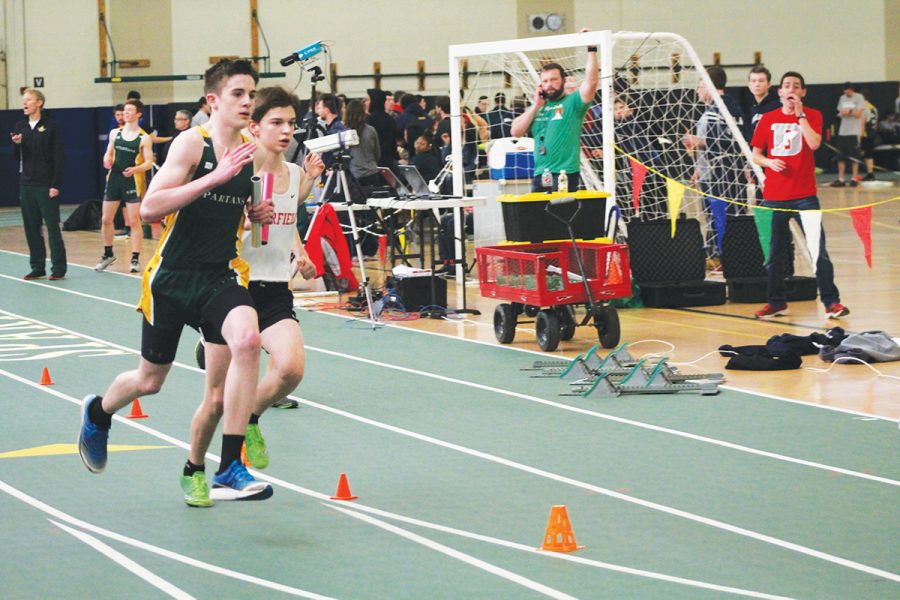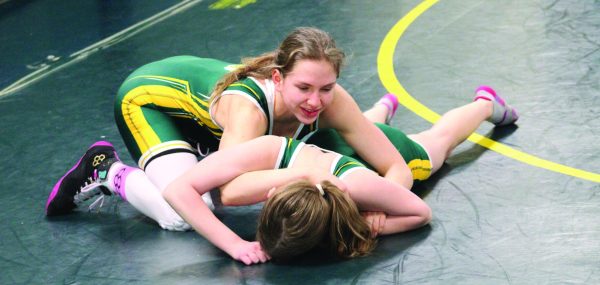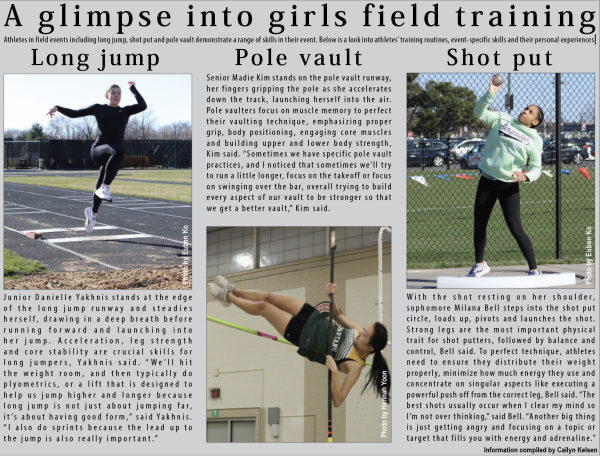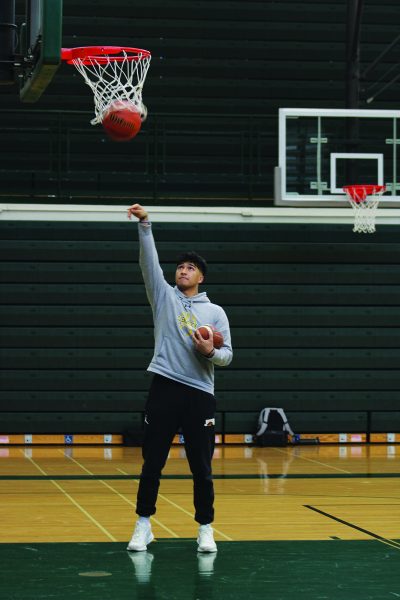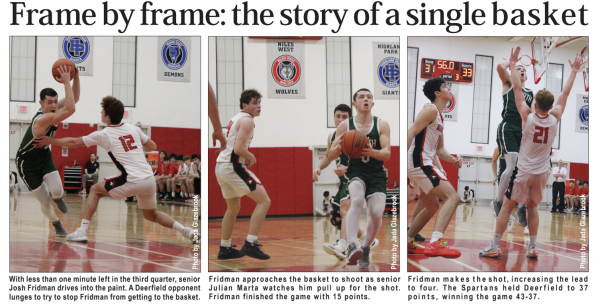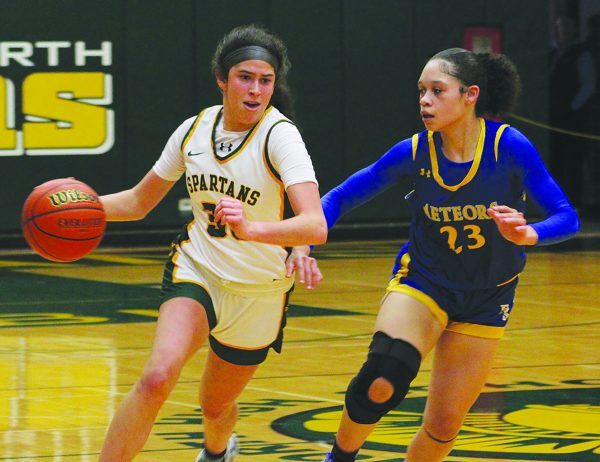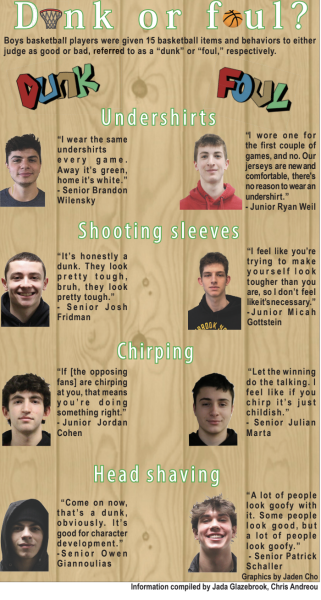Season credit changed for track
Freshman Patrick Herbst runs a relay at the CSL indoor conference meet on March 15. Beginning with the class of 2022, completing both indoor and outdoor track will not count as two sports towards the 12-Season Athlete Award. For all older athletes, completing both sports counts as two credits towards the award. Photo by Karina Belotserkovskiy
Freshman Kelsey Lundgaard planned to run cross country, indoor track and outdoor track throughout her four years at Glenbrook North to be eligible for the 12-Season Athlete Award. However, due to a policy change that affects the credit given for indoor and outdoor track, her goal is now impossible to attain.
According to Athletic Director John Catalano, indoor and outdoor track will combine their season credits into one beginning with the current freshman class.If an athlete runs both indoor and outdoor track, an athlete will only receive one season credit.
Under the previous policy, an athlete will not receive a season credit if they run indoor but not outdoor track.However, if an athlete runs outdoor and not indoor track, they will receive one season credit. If an athlete runs both, they would receive two season credits.
Sean Brandt, head boys track coach, said the policy was instituted to prevent kids from using the shorter indoor track season exclusively to earn a credit towards the 12-Season Athlete Award.
“I think that throughout the years, maybe they had some people who abused the current policy where maybe they show up because [indoor and outdoor track are] no cut sports, and they don’t dedicate themselves to it,” said Brandt. “And there’s a certain eliteness that kind of gets diluted … if people abuse the policy.”
According to Brandt, the indoor track season is limited to six weeks due to gym availability. According to the IHSA calendar, the outdoor track season is nine weeks. Other winter sports include: basketball (19 weeks), competitive cheer (14 weeks), girls gymnastics (14 weeks), boys swimming and diving (13 weeks), bowling (13 weeks) and wrestling (15 weeks).
Catalano said there was a disparity between indoor track and other winter sports.
“I guess that clearly … at the beginning of the conversation you have [indoor track] that isn’t nearly as regulated,” said Catalano. “It’s not scored. It’s not a conference thing, although we do host an invite at the end of [the season] but it doesn’t meet the same criteria as another other bigger league sports.”
Lundgaard said she considers the policy to be unfortunate as she believes indoor track athletes work hard but do not receive the same credit that other winter athletes do.
“I feel like [the policy] excludes anyone who wants to take part in indoor track from being able to be a 12-season athlete,” said Lundgaard. “I think that GBN would want to encourage a healthy lifestyle, and running is important as a sport that you can do for your whole life.”
Brandt said he sees the possibility of a loss of interest in indoor track with the new policy.
“If it’s not going to count as a season for [the athletes], a lot of them will say, ‘Why am I doing indoor track if I can just wait until outdoor track?’” said Brandt. “‘It’s either way gonna count as one season.’”
Despite the drawbacks, Brandt said he feels students will have fun participating in indoor track no matter what.
Freshman Sam Rubinstein, an indoor track runner, said he foresees a possible lack of motivation for running indoor track. However, he sees the new policy as a positive.
“I feel like [the policy] gives people like me less of an incentive to run indoor track because it doesn’t count as a season, but also I [kind of] like it because it gives indoor track more of a team vibe to it,” Rubinstein said.
Although sophomore Daniel Klein will not be affected by the change, he said he thinks the amount of work put in during the indoor track season should justifyit being a full season.
Neither Klein nor Lundgaard said they see any advantages to the policy change.
Brandt said he feels strongly that some track athletes deserve the 12-Season Athlete Award and does not want this change to deter kids from participating in indoor track if they do not already play a winter sport.
Catalano said the decision was one that has been brewing for several years.
“Well, it’s been a while since we’ve had this conversation, probably conservatively, over five or six years, and probably three or four different track coaches kind of had come to me about [the fact] that they didn’t feel comfortable with getting the same amount of credit for an indoor track athlete as you would, let’s say, a basketball player,” Catalano said.


